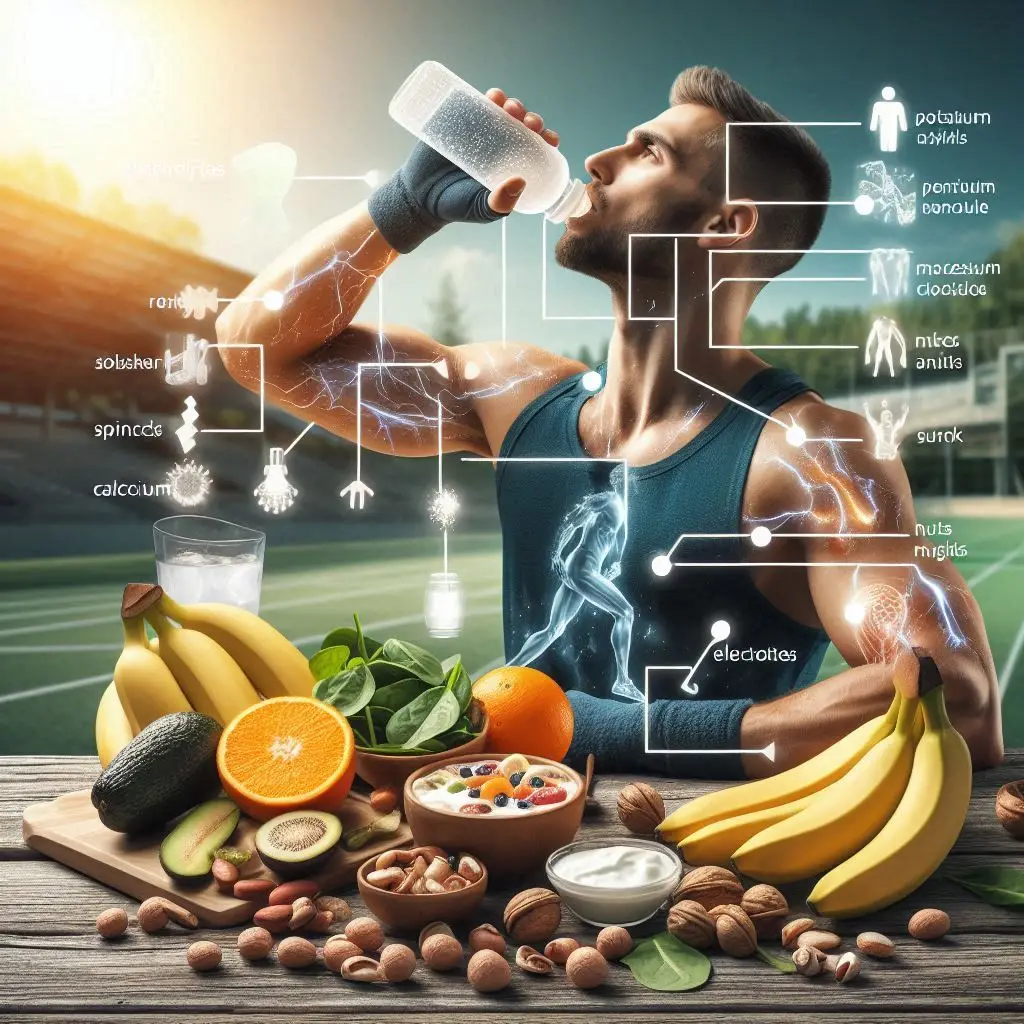The best time to eat food isn’t just about what’s on your plate—it’s about when you eat it. Some people lose weight easily while others struggle, even with the same portions, because timing affects metabolism, hormones, and energy. Many focus on calories and meal types but ignore this essential factor.
In this practical guide, you’ll learn how to use the best time to eat food for weight loss by organizing your meals to boost metabolism, limit fat storage, and apply scientific habits in your daily routine.
Why Does the Best Time to Eat Food Affect Weight Loss?
Your body doesn’t handle food the same way all day. In the morning, metabolism is higher and hormones are more balanced, while at night the body shifts toward rest and storage. When you understand the best time to eat food, you’ll notice clear changes in weight, energy, and fullness.
During active hours, cells use calories more efficiently and store less fat, and meal timing directly influences insulin—the hormone that regulates sugar storage.

Breakfast: Is It Really the Most Important Meal of the Day?
Many studies indicate that the best time to eat food that contains protein and reasonable carbohydrates is the morning. A balanced breakfast can:
- Boost metabolism
- Reduce episodes of extreme hunger later in the day
- Prevent late-night overeating
Example options:
- Oatmeal with fruit
- Boiled eggs with whole-grain bread
- Greek yogurt with nuts
Does Skipping Breakfast Help or Harm?
Some people skip breakfast to reduce calories, but this can lead to overeating later. If you want to practice intermittent fasting, it can be effective—as long as you choose the best time to eat food within a fixed eating window instead of doing it randomly.
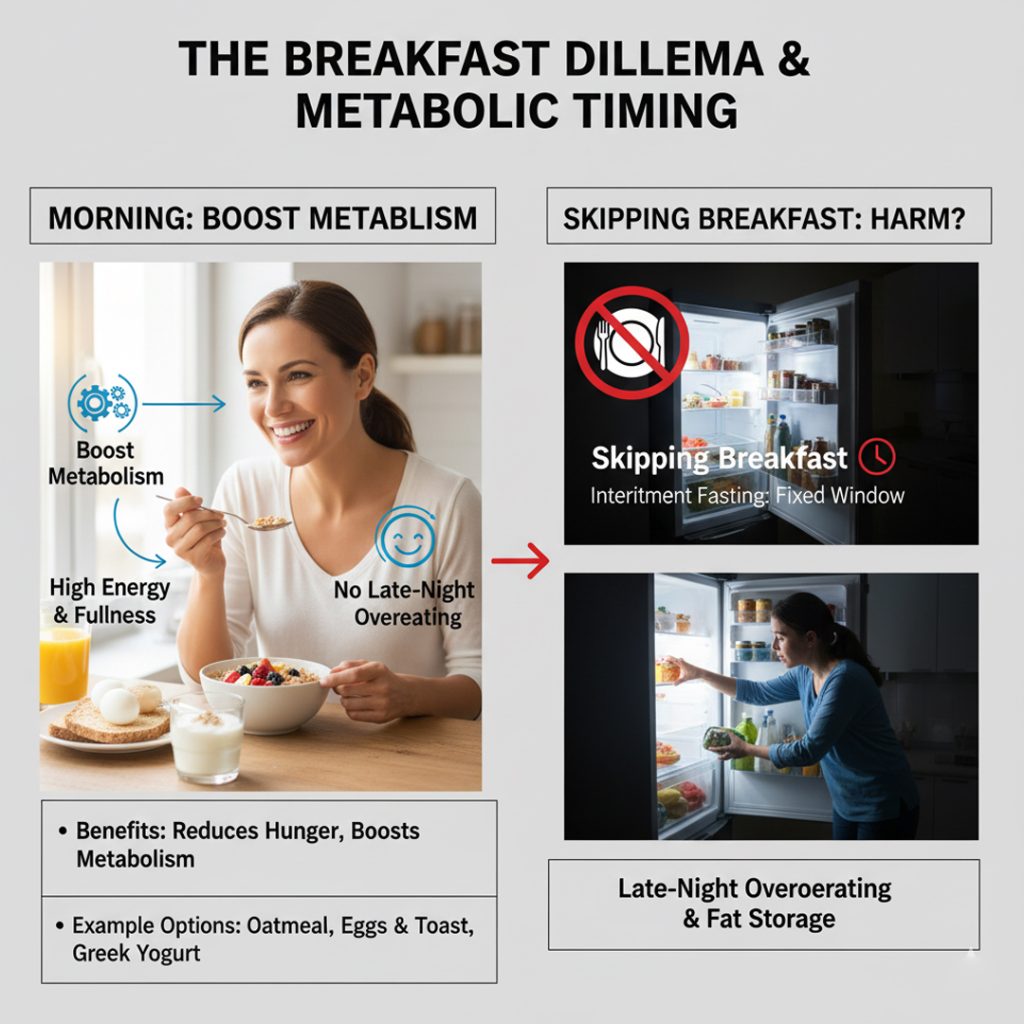
Lunch: The Peak of Energy and Metabolism
If you’re looking for the best time to eat food for weight loss, midday is the ideal moment for a substantial, balanced meal.
Why?
• The body is at peak activity
• Calories are used instead of stored
• Digestion is faster than at night
Example lunch:
• Grilled chicken or fish
• Cooked vegetables or a fiber-rich salad
• A moderate portion of complex carbs (brown rice, sweet potato, quinoa)
Dinner: Why the Best Time to Eat Food Matters More Than the Content :
“Eat early, sleep light.”
The best time to eat food in the evening is 3–4 hours before sleep.
Tips:
• Keep the meal light and protein-based
• Avoid fried foods and heavy starches
• Don’t go to bed immediately after eating

Between Meals: Are Snacks Helpful?
Smart snacks can prevent intense hunger and stabilize blood sugar. But they must align with the best time to eat food, not boredom or stress.
Examples:
• A handful of nuts
• A piece of fruit
• Veggie sticks with hummus or labneh
• Low-fat yogurt
Your Biological Clock and the Best Time to Eat Food :
Your body has an internal clock that controls metabolism. When you eat at the time your body expects food, you:
-
- Burn fat more efficiently
- Store less fat
- Improve insulin sensitivity
Ideal general schedule:
• Breakfast within two hours of waking
• Lunch between 12 and 3 PM
• Dinner before 8 PM
Intermittent Fasting: Timing, Not Deprivation
If you want to apply intermittent fasting, the key is choosing the best time to eat food within the eating window, such as:
16/8 Method:
• Fast from 8 PM to 12 PM
• Eat from 12 PM to 8 PM
Be mindful of:
• Getting protein in your first meal
• Avoiding sugars
• Not overeating at dinner
What About Exercise—Before or After Eating?
Some studies show that working out before breakfast increases fat burning, but it doesn’t suit everyone. If you’ll eat afterward, make sure it fits within the best time to eat food, aligned with your goal.
Exercising on an empty stomach may boost fat loss but could cause dizziness or low energy for some people. Exercising after a properly timed meal improves muscle recovery and reduces hunger if the meal aligns with timing and content.
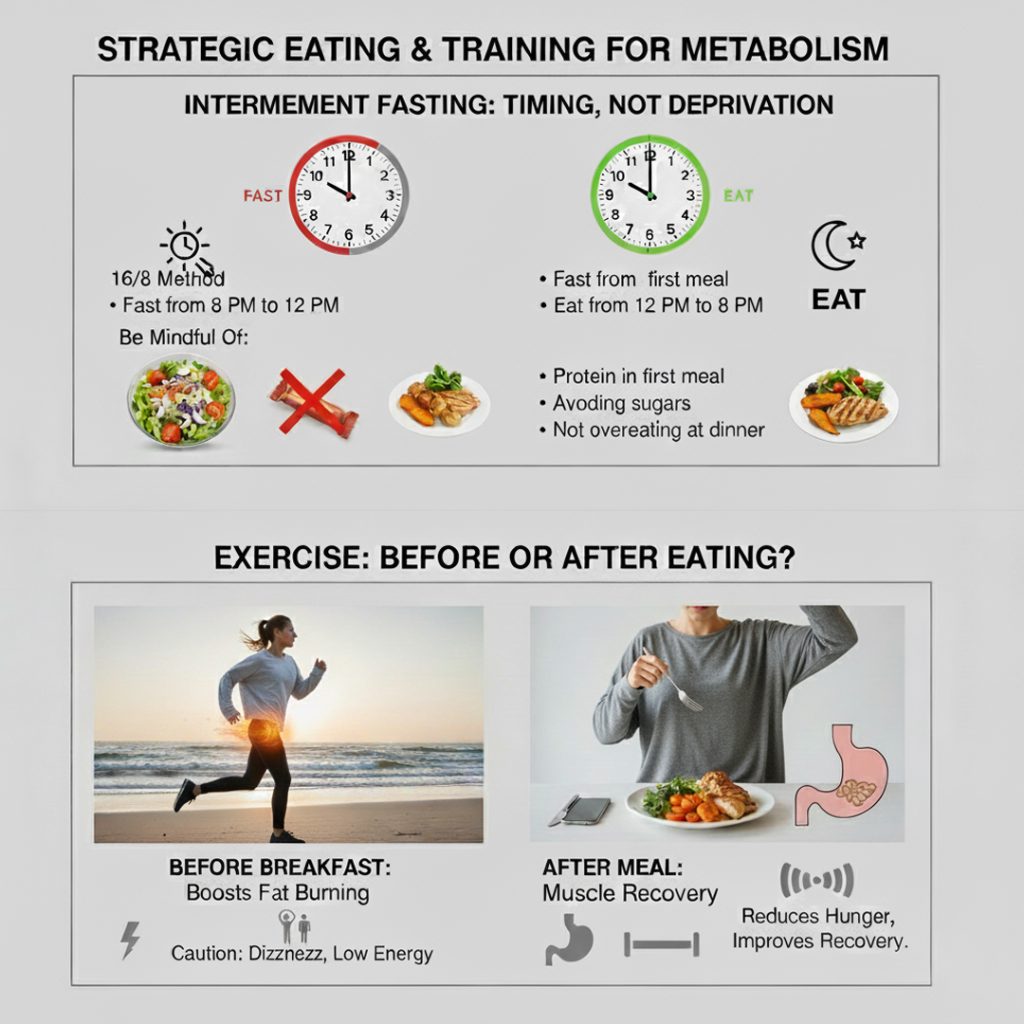
Late Dinners and Their Effect on Sleep and Weight
Eating right before bed may cause:
- More fat storage
- Disturbed sleep
- Reduced nighttime metabolism
This makes evening timing a key part of the best time to eat food for weight loss.
How to Distribute Calories Throughout the Day
To apply the concept practically:
- 35% of calories at breakfast
Start your day with a filling meal rich in protein and fiber. Your body is most active in the morning and can use energy instead of storing it. A strong breakfast reduces random hunger later. - 40% at lunch
This is usually the most energy-consuming meal, especially with mental or physical activity. Keep it balanced between protein, complex carbs, and vegetables. - 20% at dinner
As you get closer to bedtime, your body’s metabolism slows. A light, easy-to-digest meal prevents unused calories from being stored as fat. - 5% for a snack when needed
This small part is for preventing hunger between meals or keeping blood sugar stable. Choose something like nuts, yogurt, or fruit—without interrupting the overall timing of the best time to eat food.
This distribution ensures smart calorie use during the day and prevents unwanted nighttime storage.
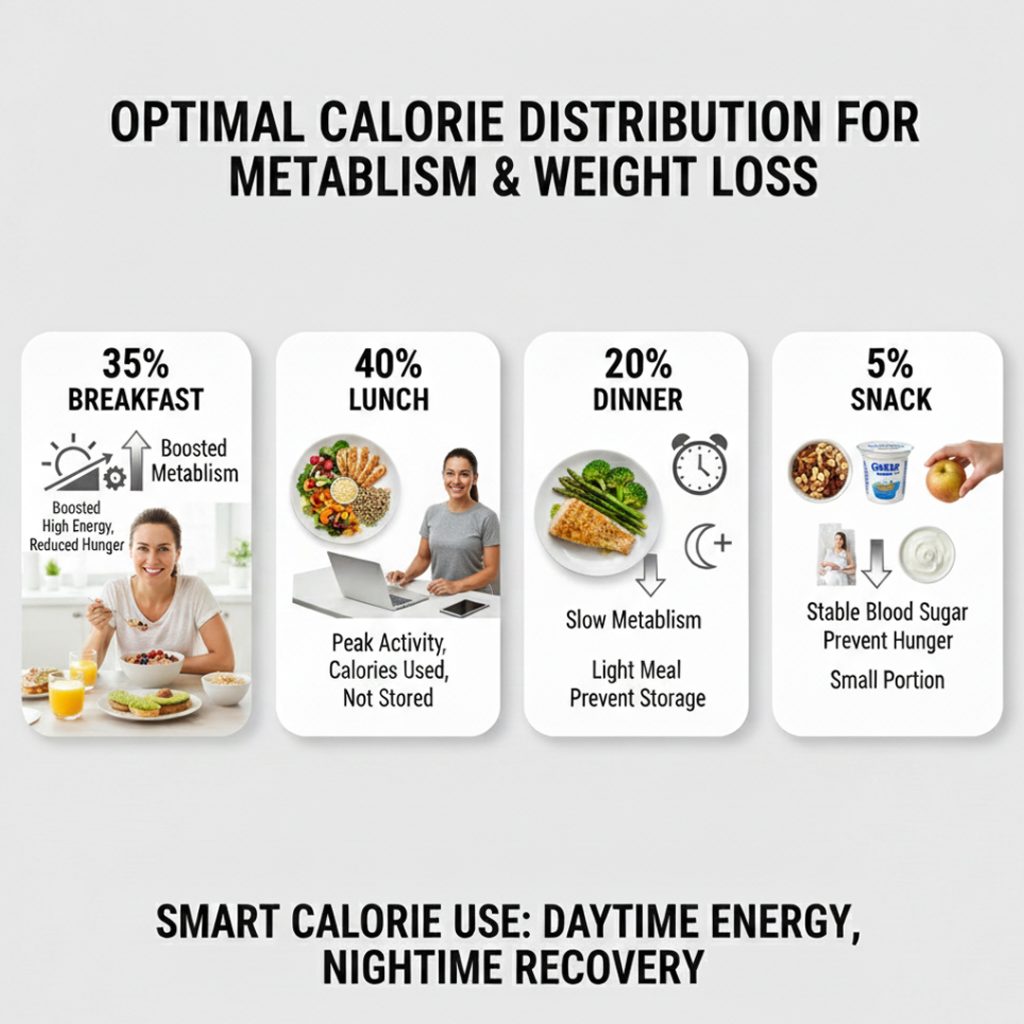
Does the Best Time to Eat Food Depend on Lifestyle?
Yes, timing varies based on:
- Sleep schedule
- Work or school hours
- Daily activity
- Exercise types
But one rule remains:
Eat more during the day and reduce intake as night approaches.
Full-Day Example Based on the Best Time to Eat Food
– Breakfast (8 AM):
Eggs + whole grain toast + cucumber or tomato
– Snack (11 AM):
A piece of fruit or a handful of nuts
– Lunch (2 PM):
Brown rice + vegetables + a source of protein
– Snack (5 PM):
Yogurt or hummus
– Dinner (7 PM):
Soup or salad with a light protein
Metabolism slows at this time, so a light, easy-to-digest meal is best. Simple proteins like tuna, grilled chicken, or lentils prevent nighttime fat storage and are gentle on digestion before sleep.
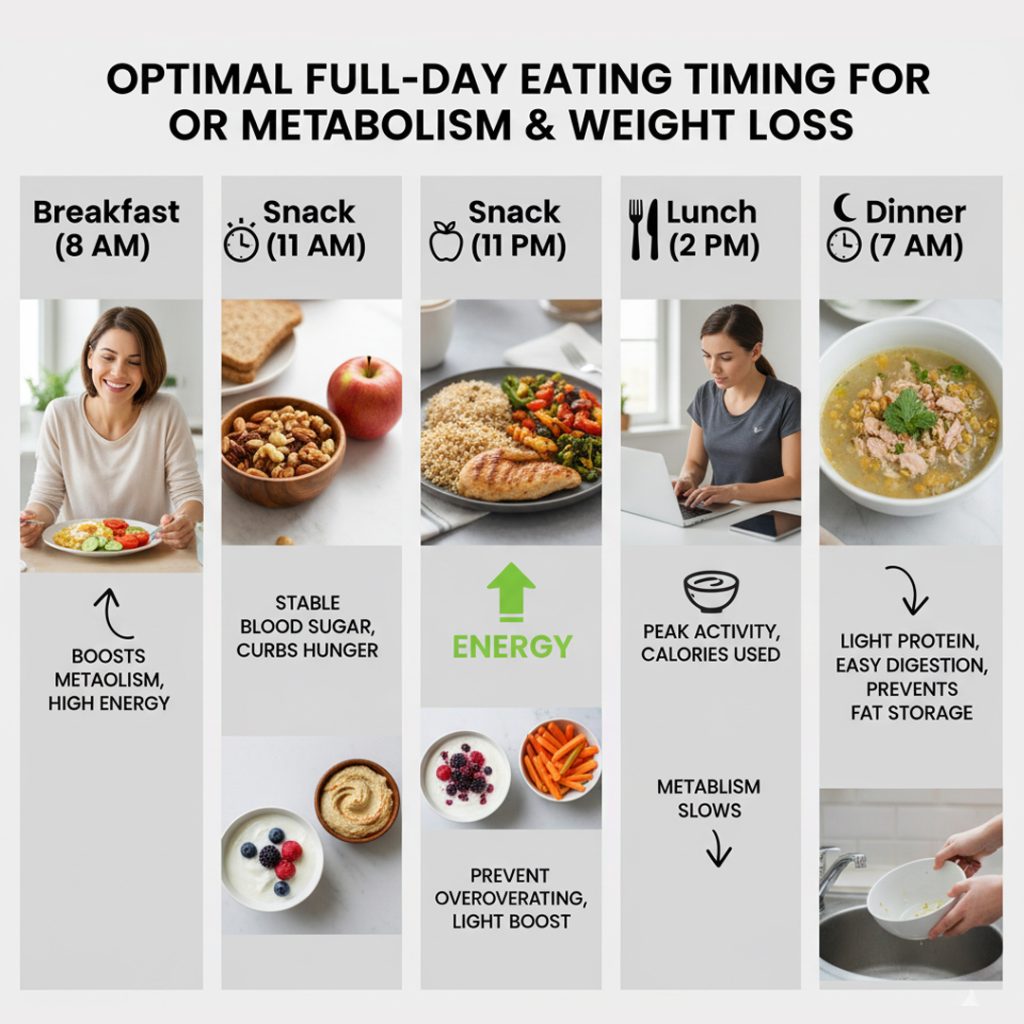
What About People Who Wake Up Late?
There isn’t one timing that fits everyone. You can adjust the best time to eat food to match your day as long as you avoid eating close to midnight.
Bad Habits That Ruin Meal Timing
- Staying up late with snacks
- Skipping breakfast
- Overeating at night
- Eating while watching TV
- Sleeping right after dinner
Can You Lose Weight by Changing Only Meal Timing?
Yes! Organizing timing can:
- Boost metabolism
- Reduce calorie retention
- Improve digestion
- Help you sleep better
The Best Time to Eat Food Based on Your Goal :
If your goal is weight loss:
Focus on breakfast and lunch, and keep dinner light.
The Best Time to Eat Food If your goal is muscle gain:
Distribute protein across 3–4 meals.
If your goal is weight maintenance:
Keep a balanced distribution.

understanding the best time to eat food is an essential step. You don’t need to starve or deprive yourself—just coordinate intelligently between your clock, your body, and your plate.
Want to learn more about optimal meal timing and customized daily meal plans?
Visit NutritionTravels now, and explore practical guides, nutrition tips, and meal planning tools to help you reach your health goals easily and smartly!



